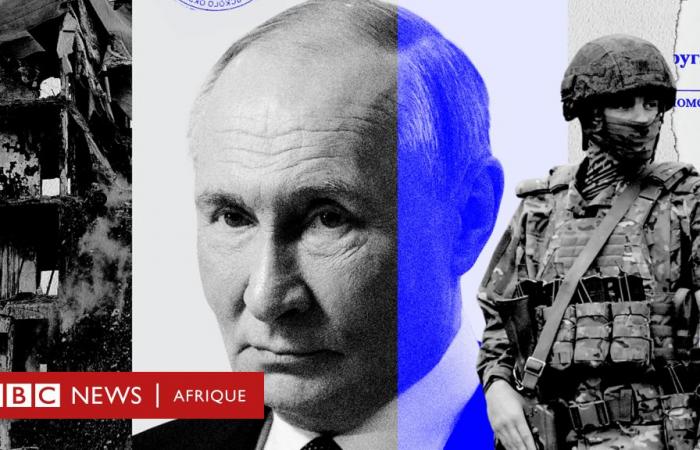- Author, Olga Robinson, Christine Jeavans, Olga Malchevska et Matt Murphy
- Role, BBC Verify
-
6 minutes ago
The Russian authorities systematically seize thousands of houses belonging to the Ukrainian residents of Marioupol, in this city occupied for three years by the Army of Russia, revealed an investigation by BBC Verify.
At least 5,700 houses have been identified for seizure, many of which belong to people who had to flee the city, shows our analysis of the documents published by the municipal authorities installed by the Russians since July 2024.
To save their homes, the Ukrainians are expected to face a dangerous return to Marioupol via Russia, exhausting security checks, a complex bureaucratic process and overwhelming pressure to accept a Russian passport.
Most of the affected properties were once occupied by Ukrainians who have either fled or died during the siege of eighty-six days of the city strategically important by Russia in 2022. Human Rights Watch said that the bombardment had killed more than 8,000 people, but noted that this figure is “probably a significant underestimation”.
Confiscations seem to be part of a larger plan to “russify” the occupied coastal city, which includes the construction of new military facilities and the change of street names with titles approved by Moscow.
The headquarters of Russia left 93 % of Marioupol’s high -rise buildings – 443 rpm – destroyed or damaged, according to a study by Human Rights Watch. Since then, Russia has claimed to have built more than 70 new buildings, but the inhabitants say that a huge housing shortage has persisted.
Photo credit, Getty Images
There have been reports that Russia grabs properties in occupied Ukraine. But a new law has accelerated the process – and made more difficult for Ukrainian owners to assert their rights.
In addition to the 2,200 houses intended to be seized soon by municipal officials, 3,550 others were identified for potential confiscation, according to municipal documents analyzed by BBC Verify.
Marioupol officials interviewed by the BBC did not wish to answer.
Halyna is one of the 350,000 Ukrainians estimated to have fled Marioupol to escape the Russian occupation. We decided not to reveal his last name because of the security concerns of his family who have remained in the city.
She said that her building in the seaside town – who had a pre -war population of 425,000 inhabitants – had been seriously damaged by Russian tanks during the siege. He was told that the “windows and doors” of the apartment had been repaired, and that people live there without its authorization. She fears that her apartment will be seized.
“It is a legalized property theft,” she said.
Russian officials use the term “owner without owner” to describe houses they say not used or without legal owner – indeed, goods not registered in Russia.
But these apartments have many legal owners – Ukrainian residents who fled the Russian occupation, or the heirs of those who died in Russian attacks.
Official documents published on the Pro -Russian administration website show the complex process – described below – which leads to the seizure of properties after they were reported by local inspectors or residents.
Within ten days following the initial report, the authorities installed by the Russians publish an advertisement on their website indicating that the property presents “signs of abandonment”.
Recording begins
Then the owner must present himself to Marioupol with ownership documents and a Russian passport. The authorities say that they will also accept other forms of identification that they do not specify.
Property on the register
If the owner does not present himself in person within thirty days of the publication of the list, the authorities begin to record the property as “without owner”.
After the property was registered in the register of “without owner”, the authorities were waiting three months before requesting an order from the court to transfer the house to the property of the city.
We could not find any files indicating how many apartments have passed the last judicial step. But during a recent conference, Oleg Morgun – the mayor of Marioupol installed by the Russians – said that a final judicial decision had been taken to seize around 600 apartments.
In practice, if your house is on one of these lists, your property is practically “impossible” to recover, said Petro Andrushenko, a former adviser to the Ukrainian mayor of Marioupol. Earlier this month, Morgun insisted that the houses will be withdrawn from the register “if an owner calls”.
Once the houses have been seized, a law adopted at the end of last year allows the authorities to transfer property to individuals. Only residents of the People’s Republic of self -proclaimed Donetsk, who have lost goods and have Russian passports, are eligible to obtain housing as part of this program.
The authorities seem to seek to make more difficult for Ukrainians to assert their rights. All houses located in places like Marioupol must be recorded in Russia – but a decree signed by President Vladimir Putin in March has prohibited citizens from “hostile” countries – including Ukraine – to record properties in the territories occupied until 2028 without special authorization.
Indeed, this leaves the Ukrainians an impossible choice: their safety and their identity, or their houses.
Pavlo said he had to stay in Marioupol during the whole seat after being beaten by Russian soldiers. He managed to prevent the seizure of his house by obtaining a Russian passport and says that “95 % of conversations in the city relate to the property”. The BBC has agreed to hide its real name to protect its identity.
In the Telegram discussions examined by BBC Verify – some containing thousands of users – many inhabitants seemed confused by the process and sometimes did not understand how their property had ended up being declared “without owner”.
“The rules are not clear and are published anywhere,” said Halyna. You can be prosecuted for anything on your phone or in the files they have on you. “
Diana Berg also fled the city to avoid the Russian occupation, leaving her family home behind. She is now elsewhere in Ukraine.
To prevent property from falling into the public domain, Diana’s parents should return to Marioupol. The only way to do so is to take a flight to Sheremetyevo airport in Moscow, where they are subject to exhausting security checks by the Federal Safety Service (FSB) – called “filtration”.
Diana said there was “no chance” that her family could go to Marioupol. “The ‘filtration’ procedure … can last up to a week. You are not imprisoned, but retained in this center for verification.”
Housing plans seem to be part of a wider campaign aimed at “russiaify” the Ukrainian city in the South. Satellite images and media relationships show that a new naval academy and a great war memorial are under construction.
A new city logo has also been created. The Ukrainian language is replaced by Russian. Russian symbols are associated with the new logo.
Although many changes have been imposed without much resistance, the housing program has aroused rare criticism from the last inhabitants of Marioupol, uncomfortable with the status of the apartments offered to them.
The demonstrations broke out after President Putin personally approved the plan in December.
A legal expert declared that the plan constituted a clear violation of the laws of war set out in the fourth Geneva Convention and the Hague Convention, which prohibit the seizure of civil goods except in very limited cases.
Professor Nehal Bhuta, holder of the Chair in International Law at the University of Edinburgh, said that the seizures were illegal because they arose from an “illegal annexation” approved by the Moscow Parliament in 2022.
For Ukrainians, Mr. Andrushenko said it was a scary and confusing process.
“It’s like someone injured you again and again,” he said. “You cannot understand how your apartment may, your property [soient] ‘without owner’. It’s like getting a hammer blow on your head. ”
The BBC has downloaded documents containing addresses lists from the official website of the authorities installed by the Russians, publicly available in Marioupol. The addresses have been standardized, and values were added for the latitude and longitude of each location, thus making it possible to draw cards.






